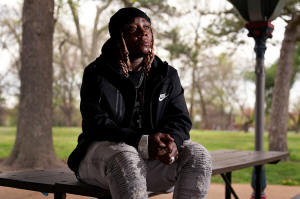In battle against transgender rights, Trump targets HUD’s housing
policies
[May 05, 2025]
By HEATHER HOLLINGSWORTH and SALLY HO
As a transgender man, the words “you’re a girl” gutted Tazz Webster, a
taunt hurled at him from the day he moved into his St. Louis apartment.
The government-subsidized building's manager also insisted on calling
Webster by the wrong name, the 38-year-old said, and ridiculed him with
shouts of, “You’re not a real man!”
“I just felt like I was being terrorized,” Webster told The Associated
Press. “I felt that I was being judged and mistreated, like I was less
of a human being.”
Then one day in March 2022, the manager shoved Webster so hard he
stumbled backward. After regaining his balance, Webster said he pushed
the manager back. Four months later he was homeless.
Webster filed a complaint with the U.S. Department of Housing and Urban
Development’s Fair Housing and Equal Opportunity office, the agency
tasked with investigating housing discrimination and enforcing the
landmark Fair Housing Act that guarantees equal access to housing for
all Americans.
Webster’s harassment allegation was serious enough that it was
investigated for more than two years, until the office suddenly notified
him in February it was dropping his case without a finding, citing lack
of jurisdiction.
The timing of the closure was not a coincidence.
In the months since President Donald Trump took back the White House and
installed a loyalist to lead the federal housing department, HUD
Secretary Scott Turner and his team have moved swiftly and strategically
to undo, uproot and remake the agency’s decades of work and priorities.

In the crosshairs is an intense focus on transgender people, as HUD
retreats from long-established fair-housing protections by closing their
discrimination complaints and, more broadly, moving to undo the
Obama-era Equal Access Rule that cemented transgender people’s rights to
discrimination protection in housing.
“It’s time to get rid of all the far-left gender ideology and get
government out of the way of what the Lord established from the
beginning when he created man in his own image — male and female,”
Turner said in announcing in February that he was halting enforcement of
the Equal Access Rule.
Sex discrimination in the Fair Housing Act
At issue is the fact that discrimination against LGBTQ+ people wasn’t
specifically cited in the Fair Housing Act. But the Equal Access Rule
enacted in 2012 under former President Barack Obama further defined sex
discrimination to include sexual orientation and gender identity.
The policy was expanded in 2016 to cover transgender people seeking help
at federally funded emergency shelters, escalating opposition from the
right.
In 2020, the first Trump administration unsuccessfully moved to relieve
shelters of any obligation to serve transgender people. Now, advocates
fear an emboldened Trump will go further and forbid shelters from
accommodating gender identity altogether, as his administration
announces unspecified revisions to the Equal Access Rule.
“Our protections can’t be a pingpong ball that changes every four
years,” said Seran Gee, an attorney for Advocates for Trans Equality.
Everything Webster owned was trashed
After being left with permanent injuries in a car crash, Webster, who
survives on disability payments, was grateful to move in April 2021 into
an apartment near the city’s 1,300-acre (526-hectare) Forest Park, scene
of the 1904 World’s Fair and home to museums and a zoo.

His rent was initially less than $200 per month, he said. That is
because Branscome Apartments had a contract with the federal government
to provide subsidized housing to people with disabilities and low-income
seniors.
But the HUD money also comes with strings, said Linda Morris, staff
attorney for the ACLU’s Women’s Rights Project, who leads the
organization’s housing discrimination work.
“The Equal Access Rule applies to HUD-funded programs and shelters,"
said Morris, who doesn’t represent Webster. "If an entity is going to
accept federal funding they have to comply.”
Under the rule, HUD-funded housing and programs must provide equal
access to everyone regardless of gender identity, and can't require
intrusive questioning.
Four months after the shoving incident, Webster found his door kicked in
and his belongings trashed, even though, he said, he was up to date on
his rent and never received an official eviction notice.
Gone were his king-size bed, dishes, Social Security card and birth
certificate. Even worse was the loss of the obituary for his mother, who
died when he was 12, and her necklace, a treasured memento.
“I had nothing,” said Webster, who had been mostly staying away from the
apartment for fear of another run-in with the manager. “I was so afraid
to be there, I would go to my friend’s house and spent nights at a time
and then come back, switch my clothes,” and leave.
Court records in an eviction case filed against Webster in April 2022
cited repeated unsuccessful efforts to serve him. After he was gone, the
case was dropped.
Last August, Webster filed a lawsuit in Missouri state court alleging he
was illegally evicted.
“There was never a court order allowing them to change the locks,
allowing them to throw away his belongings,” said attorney KB Doman of
Arch City Defenders, an advocacy group representing Webster.
The suit seeks $25,000 in property damage and for “severe emotional
stress and trauma.” The apartment has denied the allegations in court
filings.

Stephen Strum, the attorney representing the building, declined the AP's
requests for comment on the HUD case and said the pending lawsuit
“merely alleges that my client did not properly follow the steps for
evicting.”
To Doman, Webster's case reflects a larger trend.
“A lot of people that would have some recourse, at least through HUD
investigating, really are just out on their own now,” she said. “It’s
going to be harder for trans people to find safe, stable housing, and
it’s very hard already."
Closure of Webster's case is just one of many, HUD attorneys say
Since Turner took the helm at HUD, the Office of Fair Housing and Equal
Opportunity has instructed staff to pause investigations of all gender
identity discrimination cases, according to two HUD attorneys who spoke
on condition of anonymity for fear of losing their jobs or benefits.
One said letters were then issued closing the cases for lack of
jurisdiction. HUD has not disclosed how many cases have been dropped.
Webster's letter and another provided to the AP cite Trump’s executive
order calling for the federal government to define sex as only male or
female.
[to top of second column]
|

Tazz Webster, who ultimately wound up homeless after an apartment
manager allegedly ridiculed and shoved him because he is
transgender, poses for a photo, April 9, 2025, in St. Louis. (AP
Photo/Jeff Roberson)

Morris, of the ACLU, said she has never seen an executive order
cited in a jurisdictional closure of a complaint.
“So that’s really alarming,” said Morris, who described the closures
as “very much consistent with this administration’s broader attacks
on trans people and on civil rights more broadly.”
Asked about policy changes concerning transgender discrimination,
HUD spokesperson Kasey Lovett said the agency was enforcing the Fair
Housing Act while implementing Trump’s executive order “restoring
biological truth to the federal government.”
In a statement citing Trump's order, she said government policy
recognizes two sexes that "are not changeable and are grounded in
fundamental and incontrovertible reality.”
‘A nationwide federal push to erase trans identity’
Bea Gonzalez, a transgender man, was kicked out of a suburban St.
Louis domestic violence shelter on a chilly night in November 2021,
along with his three children, then 2, 5 and 7.
The family was just settling into a room after filling out paperwork
at Bridgeway Behavioral Health Women's Center when Gonzalez was told
they had to go because he disclosed he was a transgender man.
"I wasn’t about to go back into the closet,” the 33-year-old said of
his insistence on telling the truth even after it was suggested he
keep his trans identity secret.
He needed a domestic violence shelter, he said, for greater security
for the children and because he feared for his safety as a trans man
in a men’s shelter, some of which don't accept children anyway.
The city had no domestic violence shelters for men, said his
attorney Kalila Jackson. "In the St. Louis metropolitan area, there
was no place else for him to go. There were no other options.”

The family was sent to a motel, but when they arrived they
discovered it hadn't been paid for, and the organization that sent
them there was closed. “So I was stranded," said Gonzalez, who did
not have a car. "I had to call a friend who was able to let us stay
for the night.”
Jackson said Bridgeway received HUD funding and that its policy of
barring transgender men was a violation of the Equal Access Rule and
“straight up sex discrimination.”
Jackson said the message the shelter sent was this: “You’re
biologically a girl, you should dress as a girl. Since you say that
you are a man, we are not going to accept you here.”
HUD didn’t address Gonzalez’s or Webster’s complaints when the AP
sought comment on their cases.
HUD investigated Gonzalez's complaint for 2 1/2 years until it
suddenly notified him in March the agency was dropping it without a
finding. The company operating the shelter, Preferred Family
Healthcare, did not respond to the AP's requests for comment.
After 455 days of being shuttled between six shelters in six cities
in two states — Missouri and Illinois — Gonzalez ultimately found
stable housing, where his children live with him part time.
He sees what happened as part of what he describes as a “nationwide
federal push to erase trans identity."
Shelters struggle to comply with Trump directives
Advocates are concerned by HUD’s shift, noting high rates of
discrimination — and homelessness — among people who are LGBTQ+.
Nearly one-third of trans people say they have been homeless at some
point in their lives, while 70% who stayed in a shelter reported
being harassed, assaulted or kicked out because of their gender
identity, according to an Advocates for Trans Equality survey
released in 2015, a year before Obama expanded protections for trans
people in shelters.
Teens who come out to families who aren’t accepting are particularly
at risk, said Ann Olivia, CEO of the National Alliance to End
Homelessness.

Some shelters that might have served them in the past are becoming
less welcoming now amid upheaval with the Equal Access Rule, Olivia
said.
“Folks who are trans just won’t go if they don’t think that they’re
going to be treated with respect,” she said, adding that is
particularly problematic for young people who are "vulnerable to sex
traffickers and to other types of abuse.”
Further complicating the situation are seemingly contradictory
requirements in new HUD contracts with nonprofits that find
permanent housing and run shelters for the homeless. One section
stipulates they can’t promote “gender ideology” while another
requires compliance with anti-discrimination law, according to a
copy provided to the AP.
Organizations say they are confused.
“What is promoting gender ideology? What does that mean?” asked
Jeannette Ruffins, CEO of Homeward NYC, a nonprofit that runs three
permanent housing sites for LGBTQ+ young adults, as well as a
homeless shelter.
“Does housing LGBTQ young adults promote gender identity?” she
asked. "You know, they’re coming to us. This is already their gender
identity. Like I’m not promoting it.”
Ruffins called a board meeting to discuss potential
“vulnerabilities” on their website, something she said most New York
City nonprofits were doing as well.
Her organization made small changes to their website, saying they
were LGBTQ+ “affirming and friendly” in a few places rather than
LGBTQ+ “serving,” hoping that will make them less of a target.
In Memphis, Tennessee, a nonprofit that provides emergency shelter
for transgender people is looking to increase capacity because of
the uncertainty.
Kayla Gore, executive director of My Sistah’s House, said it can do
that because it doesn’t take federal funding.
“People are confused,” Gore said. “They don’t know what to do
because they want to protect their bottom line.”
‘This is the world’
Nearly three years after losing his apartment, Webster remains
homeless, staying with friends and sometimes sleeping on the floor.
He is on a waiting list for subsidized housing because he can’t
afford rent otherwise. But he expects the massive federal funding
cuts and Trump administration directives banning diversity, equity
and inclusion initiatives will make the wait even longer.
“Let’s be honest. This is the world,” he said. “People, they do
hateful things. If you legalize them to hating, then they feel like
they have a right.”
All contents © copyright 2025 Associated Press. All rights reserved |